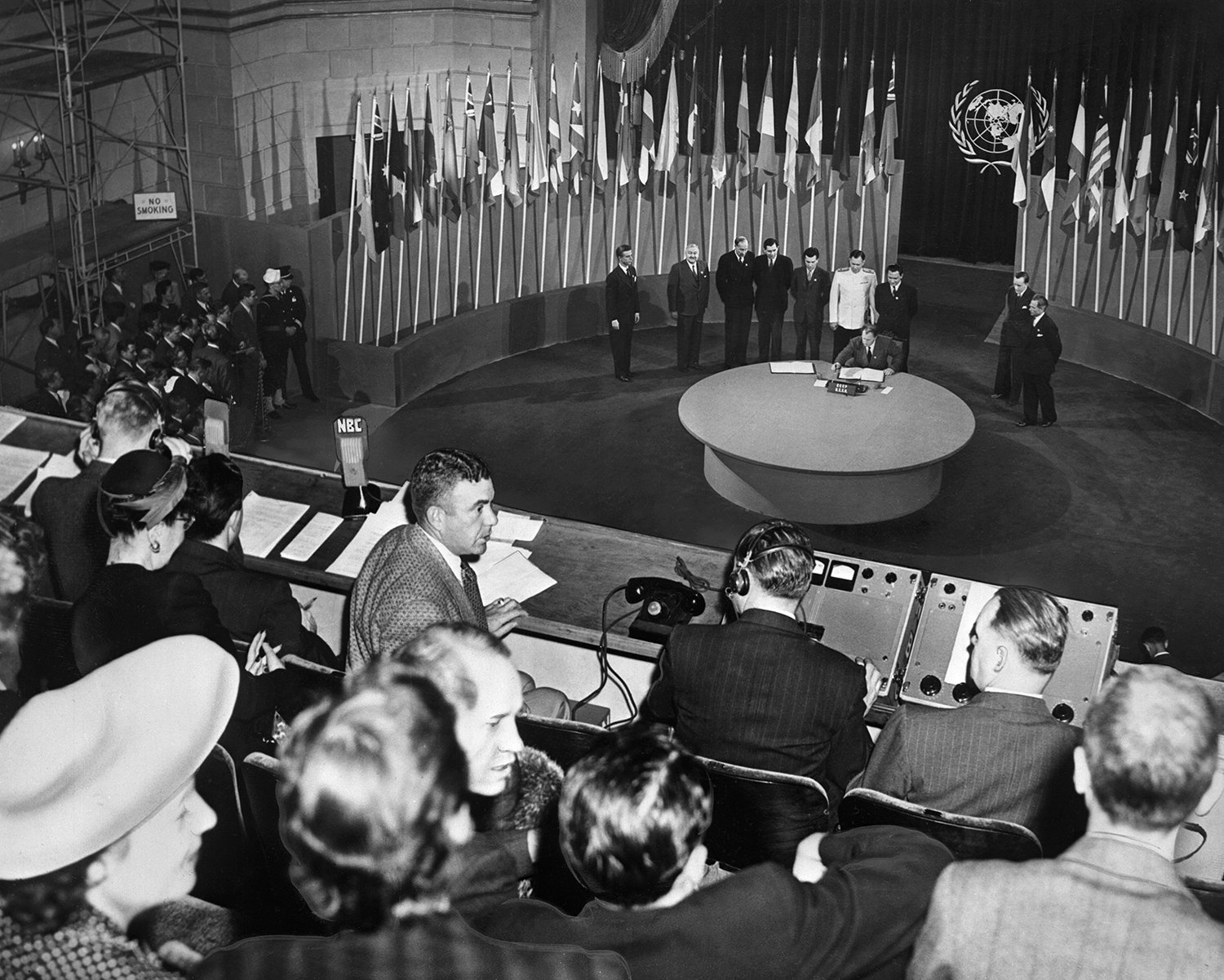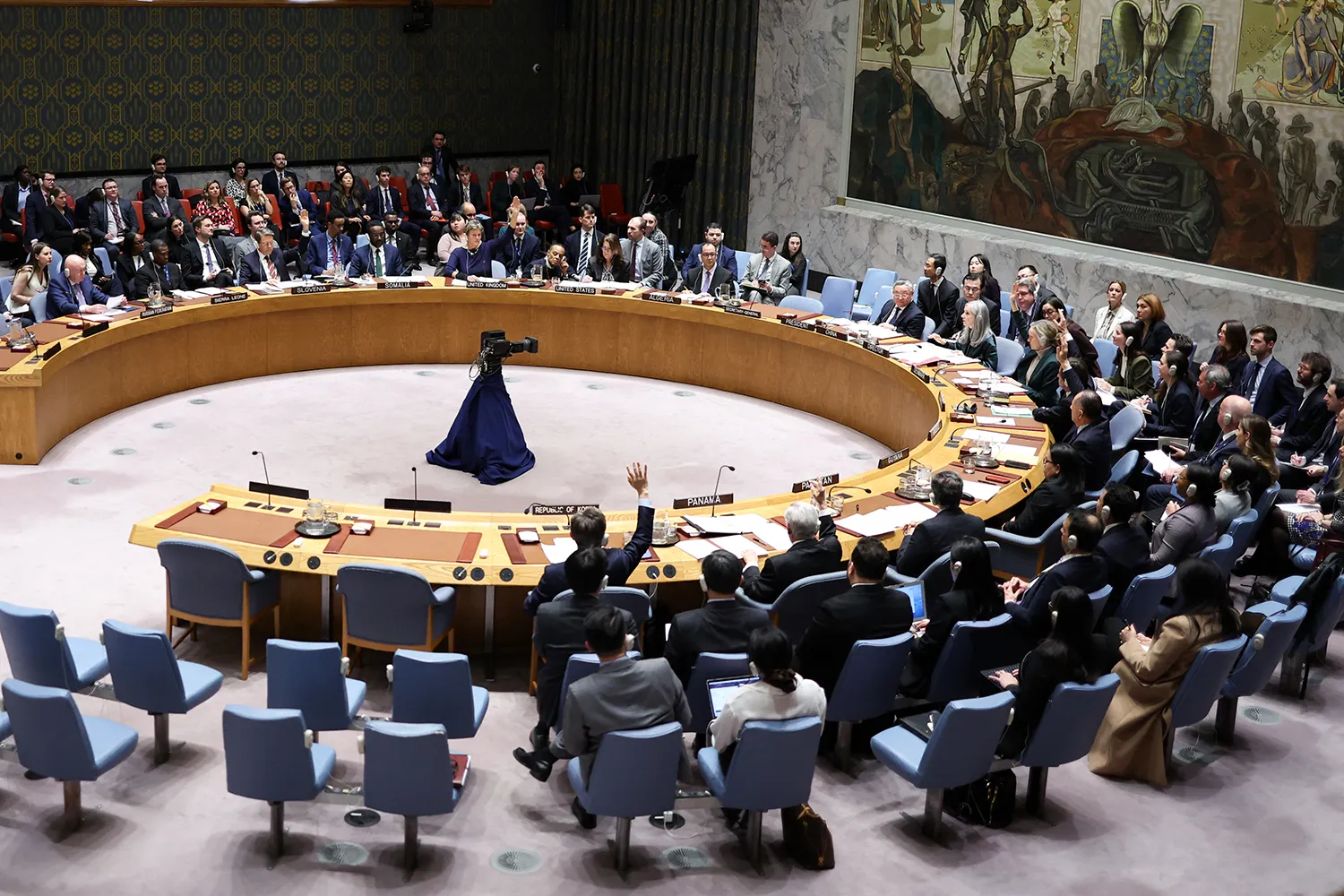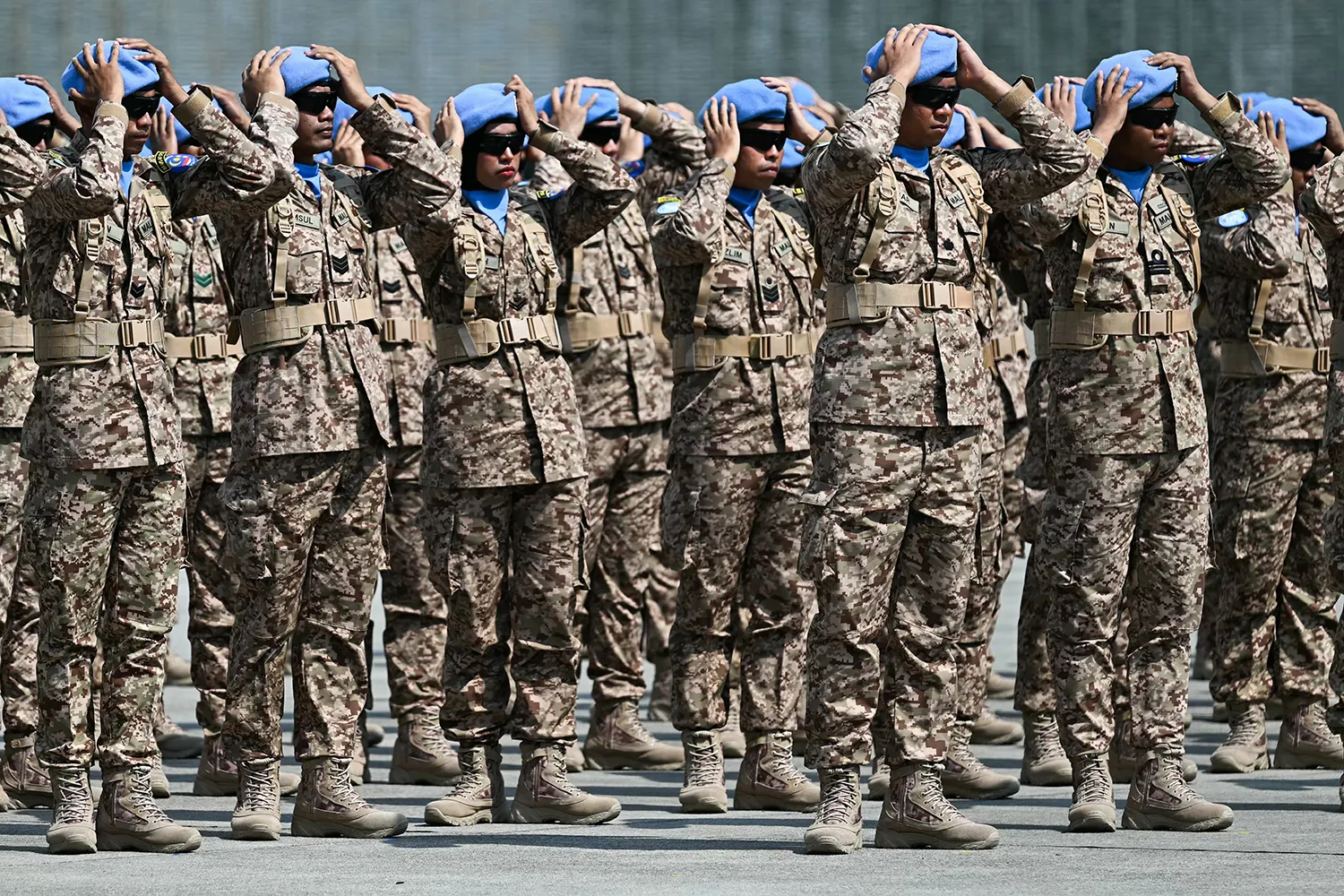The United Nations celebrates its 80th birthday in a state of advanced disarray. Signed by the representatives of 50 states on June 26, 1945, the organization’s charter set out to “save succeeding generations from the scourge of war.” Today, the U.N. has 193 members, but amid ongoing bloodshed in Ukraine and Gaza and elsewhere, none of them—including the five veto powers in the Security Council—can pretend that it is succeeding.
The war between Israel and Iran has only highlighted the organization’s limitations. The Security Council has met repeatedly to discuss the crisis; ambassadors have traded barbs; and China, Russia, and Pakistan drafted a resolution condemning the U.S. attacks on Iranian nuclear sites. But this is all little more than diplomatic performance art, and nobody really believes that the U.N. has the authority to halt the war.
The Trump administration has meanwhile plunged the institution, which has long been short on cash, into a financial crisis by withholding almost all funds for its activities. Secretary-General António Guterres has directed staff to slash the workforce by a fifth in 2026. Big U.N. humanitarian agencies such as the World Food Program, which are heavily reliant on U.S. support, are making even more drastic cuts. In private, very senior international officials speculate that the U.N. may go the way of the League of Nations.
Despite this grim backdrop, there is curiously little real debate in New York about what the long-term future of the U.N. could be. The organization’s staff members are focused on whether their jobs will disappear, or if they will have to relocate to new offices in Kenya to save cash. Diplomats lament the situation but note that their political masters in capitals have other priorities. Governments the world over are concentrating on how to deal with U.S. tariffs and evaluating how Washington’s policies will impact their security. Few have time to worry about multilateral affairs—or the appetite to pick a fight with Trump over second-order concerns in the U.N. system. Officials accept that, at a minimum, the organization will have to take the pain and do “less with less.”
Yet sooner or later, there will have to be a more serious discussion among U.N. member states—or at least those that still feel a residual responsibility for the organization—about what this means in practice. The U.N. system has evolved haphazardly since its foundation, often in response to major crises and unanticipated geopolitical shifts. It is unlikely to implode completely, even under the pressures that it faces.
But what a smaller U.N. will look like—and what it can achieve in a fragmented and competitive geopolitical environment—is still up for grabs, and nobody has a clear answer yet.

For all the United Nations’ flaws, the organization still has some simple values that are worth protecting. It offers a rare space for increasingly divided big powers to parlay and even find a few areas of common ground. For smaller states, it is a unique stage on which to speak out on global affairs, even if their ambassadors often feel that they are shouting into the void. And while U.N. humanitarian efforts and peace operations may bear the brunt of U.S. funding cuts, they still offer safety nets for vulnerable populations that other organizations are either unwilling or unable to provide.
By some criteria, the U.N. has always been a disappointment. The crafters of the U.N. Charter, who proposed the organization at conferences in Dumbarton Oaks and San Francisco, envisaged an organization that would allow the big victorious powers that emerged from World War II—the United States, Soviet Union, China, Britain, and France—to police the world. That vision fell apart almost as soon as the U.N. started to operate, as the Cold War began and the European empires began to disintegrate.
But through a mix of luck and judgment, and amid fierce political arguments, the organization evolved to help steer decolonization and manage Cold War tensions. It then expanded its activities dramatically in the post-Cold War moment, which created unprecedented space for cooperation. This process was also turbulent, punctuated by humanitarian disasters and diplomatic breakdowns, including over the Rwandan genocide and the Iraq War. After each of these setbacks, some pundits declared the U.N. to be at death’s door. But the organization repeatedly recovered and carried on, setting out more ambitious goals on issues such as development and climate change to justify itself.
The end result, diplomats grumble, is now an overextended organization that is too easily bogged down in trivialities. In early May, Guterres pointed out that the U.N. secretariat alone currently has 3,600 mandates—taskings with budgetary implications—agreed upon by member states. When the Trump administration then refused to back a General Assembly resolution declaring July 11 World Horse Day, a lot of foreign representatives were quietly sympathetic with the U.S. argument that the U.N. needs to rein in such symbolic follies. They are also open, at least in theory, to merging some of the organization’s multiple funds and agencies to find costs savings, although all admit that this would be a very knotty process in practice.

But while diplomats like to say that the U.N. should get “back to basics,” different groups of states have divergent understandings of exactly what basic tasks the organization should devote its remaining resources to.
In broad terms, states divide along familiar lines dating back to the Cold War era. Western officials tend to say that the U.N. needs to regain its footing in conflict prevention and peacemaking. Even Trump administration officials say they want to see the U.N. focus on its “founding purpose” of peace. There is no doubt that the organization—which played a significant role in mediating conflicts and peacekeeping in the post-Cold War era—has struggled to respond not only to the wars in Ukraine and Gaza, but also bloodshed in Ethiopia, Sudan, and Myanmar.
This is, in part, a symptom of geopolitical trends, as deteriorating relations between the United States, China, and Russia have hamstrung the Security Council. But diplomats also fault Guterres and other U.N. officials for taking a risk-averse approach to conflict management and behind-the-scenes crisis diplomacy.
Officials from the so-called global south acknowledge the U.N.’s difficulties with peacemaking—and complain that Western powers have not seriously backed any U.N. peace efforts in Gaza—but counter that the organization should prioritize economic development. There is a high degree of frustration among representatives of poorer countries who argue that wealthier states have not met past aid pledges, and many in Europe in particular are now diverting funds to defense.
These frustrations have regularly bubbled over in U.N. debates since Russia launched its all-out war on Ukraine in February 2022. In 2022 and 2023, European officials frequently lobbied their non-Western counterparts to condemn Moscow’s breach of the U.N. Charter. Many agreed to do so but also pushed back, demanding to know why rich countries have defaulted on their own U.N. commitments on aid.
One reason that U.N. members are tiptoeing around a broader debate on the organization’s future—in addition to competing priorities with the United States—is that they worry it would degenerate into another shouting match over how to allocate scarce resources to these priorities. There are many other potential irritants in the mix. Just as developing countries resent shortfalls in development aid, they also accuse wealthier states of failing to offer enough support for their climate adaptation efforts.
On the normative plane, liberal diplomats worry that the U.N. is increasingly losing focus on issues such as human rights and gender rights, on which it was a progressive force in the 1990s and the early decades of this century. Those who want the organization to remain a force for the advancement of such principles now fear that it faces threats from multiple sides. They see China and Russia often aiming to water down human rights commitments while a revisionist Trump administration wants so-called “woke” words—such as “diversity”—cut from all U.N. texts.
The sensitivities surrounding the U.N.’s future are foreseeable. U.N. members should start discussing them quietly now, to see if there are ways to minimize future rows. Small groups of diplomats are already having tentative discussions about these topics in and around Manhattan. If they get into more depth, then they may find some unexpected openings for consensus. Representatives of developing countries who demand more support for U.N. aid efforts in public can, for example, be privately scathing about what the U.N. actually does in terms of aid delivery.
Yet framing arguments over multilateralism solely in familiar north/south or liberal/conservative divisions may distract from exactly how turbulent the coming period will be for the United Nations. This framing assumes that states will still play by established rules of the diplomatic game. A quick glance at the world beyond Turtle Bay suggests that they won’t.
Eighty years after the finalization of the U.N. Charter, some of the core principles that it contains—and which even U.N. skeptics admit have been sources of stability—are now in doubt. While Russia has ignored the charter’s prohibition of aggression and defense of states’ territorial sovereignty in its invasion of Ukraine, Trump has implied that he could flout both to gain control of the Panama Canal and Greenland. Whether or not that is just idle talk, the fact remains that the current leadership of the United States—the de facto final guarantor of the U.N. system since its creation—is no longer a champion of its values. Washington’s strikes on Iran on June 22, which China and Russia were quick to point out violated U.N. Charter prohibitions against the use of force, underline that reality.
The U.N. is also still adapting to China’s rise—which has led to Sino-U.S. friction in New York and Geneva—and the strengthening of new multilateral platforms such as the BRICS bloc, comprising Brazil, Russia, India, China, South Africa, and a handful of recently added nations. The octogenarian world organization not only faces doubts about its own priorities, but also uncertainty about where it fits in a universe of younger and more attractive alternatives, even their own agendas are often still nebulous.
Against this backdrop, it is necessary to ask what the United Nations’ remaining comparative advantages may be. It does still have a few. International officials point out that a lot of technical U.N. agencies, such as the International Telecommunication Union, continue to beaver away at facilitating essential—if low-profile—aspects of international cooperation. These entities could keep going even if the U.N. faded away as a factor in higher-level international politics.

Even when it comes to geopolitics, the organization still has a few continuing strengths that are worth recognizing and preserving.
First, it remains a space where the major powers meet, identify each other’s red lines, and bargain on a day-to-day basis at a time when other channels of communication are closed or difficult. Throughout Russia’s war against Ukraine, Moscow and the Western powers have used the Security Council as a clearinghouse to maintain cooperation on other problems, such as Afghanistan. This has not been easy—and Russia is willing to use its veto to protect friends such as North Korea—but there is no other venue for this residual cooperation.
The U.N.’s second comparative advantage, although ironically one that the charter drafters did not fully anticipate, is that it is a space where the small- and medium-sized powers that do not get invitations to the BRICS or G-7 still have a voice. During the Cold War, U.S. commentators frequently complained that decolonization had led to a host of small, poor countries packing the U.N. General Assembly.

In recent years, by contrast, the main powers—including the United States during the Biden administration—have used the U.N. a space to court smaller countries in a relatively cheap and easy manner. Effective diplomacy by small states can have outsized consequences: Mauritius used a series of U.N. votes and judgment to nudge the United Kingdom into agreeing to transfer the Chagos Islands last year. Smaller rank-and-file U.N. members will hold onto the institution as long as they can.
Finally, although the U.N. is often as bureaucratic and slow as its critics claim, it more or less knows how to run some complex things such as peace operations and humanitarian aid. The U.N. does not always manage these field operations well, but nobody else does much better. In recent years, diplomats in New York have grumbled about the inefficiencies of blue-helmet peacekeepers. But when the Security Council sent a non-U.N.-managed, Kenyan-led police mission to tamp down violence in Haiti last year, it became bogged down in administrative and financial problems even before it had to grapple with heavily armed gangs in Port-au-Prince. And while the United States and Israel have complained about U.N. aid delivery in Gaza, the Trump administration’s effort to set up a standalone Gaza Humanitarian Foundation to feed Palestinians has been a complete disaster.

Washington’s cuts to international aid this year will curtail U.N. aid and peacekeeping operations, but the Trump administration may eventually see their utility. Optimistic aid workers predict that Washington could restore some funding for their efforts in order to avoid the embarrassment of humanitarian disasters running out of control. One European diplomat in a recent informal conversation predicted that the administration will also eventually ask the U.N. to send blue-helmet peacekeepers to Haiti, as no other option is feasible. Another, also speculating off the record, mused that the Security Council, and perhaps even blue-beret monitors, could oversee a Russia-Ukraine cease-fire in the (for now remote) scenario that one is reached. As in the past, one-off crises may do as much to shape the U.N. as diplomatic debates.
For the time being, it is necessary to accept that the United Nations will enter its ninth decade smaller and poorer than the past. It is certainly far less influential than its founders hoped. But if it can remain open as a channel both for major-power bargaining and for smaller states to make their voices heard, then it will continue to have diplomatic value. If its operational arms can at least maintain services to the world’s neediest populations despite U.S. and other aid cuts, then it will help the vulnerable through a dangerous time.
As the U.N.’s members navigate a wildly uncertain world, they should at least aim to maintain some of the organization’s basic contributions to handling global disorder.
The post At 80, the U.N. Is Down But Not Out appeared first on Foreign Policy.




